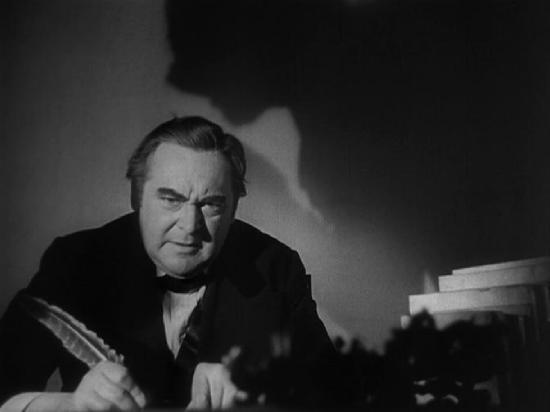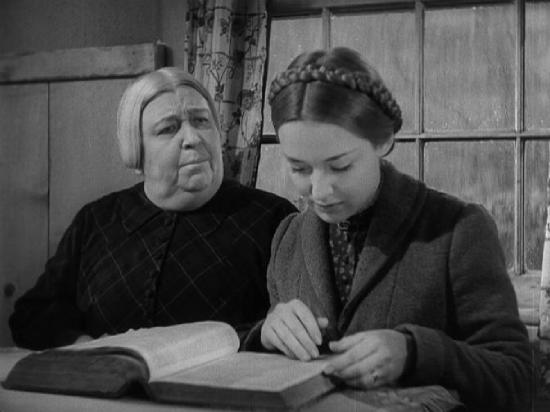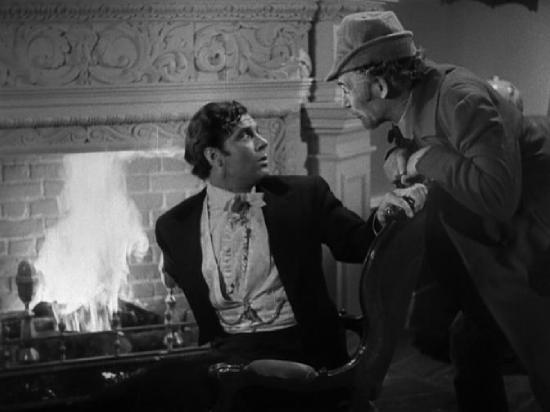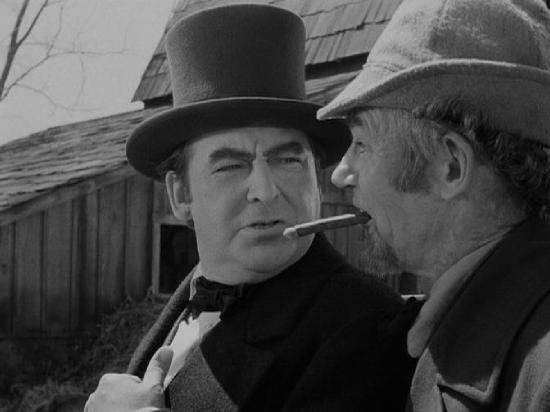The Devil and Daniel Webster
Introduction
The 16th century German legend of Faust has been made into numerous books, plays and films. The first screen adaptation was F.W. Murnau's Faust: Eine deutsche Volkssage (1926) by but there have been several other versions and adaptations, including this 1941 film based on a story by Stephen Vincent Benét, called The Devil and Daniel Webster.
Set in New Hampshire in 1840, Jabez Stone is a farmer struggling to survive. Up to his ears in debt and forced to sell his only calf, he's nearing his wits end when a sack of grain catches on the barn door and spills onto the sodden floor. In exasperation he yells out that he'd sell his soul for two cents and suddenly the mysterious Mr. Scratch appears and offers Jabez a deal where, for his worthless soul, he can have seven years of good luck and financial prosperity. Tempted by a pile of gold coins, Jabez signs the contract in blood and his money worries are a thing of the past.
A lawyer-turned-politician, Daniel Webster, a frequent visitor to Jabez' hometown of Cross Corners is popular with the townsfolk who respect him and what he's trying to do in Congress. Jabez' wife Mary admires him so much that she names their son Daniel but as the money corrupts Jabez and he begins to lose his friends, both his marriage and relationship with his mother also become strained.
When the seven years is up and Mr. Scratch comes calling, Jabez turns to Daniel Webster for help, with the lawyer demanding a fair trial for his American friend. Allowing Scratch to pick a jury of 'the quick and the dead', Webster realises he's up against it with John Hathorne as the judge and men like Benedict Arnold making up the jury.
Video
Despite critical acclaim, The Devil and Daniel Webster was not commercially successful when initially released and was hacked to pieces and had over 20 minutes of footage removed before being re-released under the title All That Money Can Buy. The film bears the scars of its rough treatment, with some print damage and detritus throughout, despite the significant restoration work. Though the picture is far from pristine, the film is wonderfully shot with excellent cinematography and camerawork, clearly reflecting the influence of expressionism on the film education of the German émigré William Dieterle.
Audio
The sound quality is also not great, possibly due to neglect, and there is a constant hiss. However, this doesn't distract from Bernard Herrmann's superb Oscar-winning score and the dialogue is clear and easy to make out. There are optional English HoH subtitles available which are clear and easy to follow.
Extra Features
On the disc, the only supplementary material is a four minute comparison piece between The Devil and Daniel Webster and Here Is A Man (an alternate edit of the same film); the only difference is the appearance of Mr. Scratch in the latter, flashing up for a second or two in negative, showing his influence of events more overtly.
The DVD comes with a 60 page booklet including the essay 'Is The Devil American?' by Tony Williams (reprinted from The Horror Reader), brief pieces by William Dieterle and Stephen Vincent Benét, together with Benét's original short story - this booklet is an excellent companion piece to the film.
Conclusion
The Devil and Daniel Webster is a stunning piece of cinema, half of a critically acclaimed but commercially unsuccessful double bill for RKO, made on the same set and released just after Citizen Kane. It obviously benefits from Orson Welles' box of tricks but William Dieterle brought his own expertise from Germany which really pays off in the expressionist visuals.
Although set in the mid-19th century, this is obviously a product of its time with great emphasis placed on the importance of being American, sticking together in the face of external aggression and not allowing yourself to be corrupted by false wealth. The emphasis on the good church-going wife and mother and their contrast with the increasingly decedent Jabez, who is seduced into taking on a foreign maid with whom he obviously breaks his marital vows is a clear indication that Dieterle saw the threat from Europe and wove it into Benét's story.
On the technical side, Dieterle's direction and Herrmann's score really stand out and on the acting front Walter Huston is superb as Mr. Scratch with a performance that earned him and Academy Award nomination. Jane Darwell shows the form that won her an Oscar for The Grapes of Wrath (1940), playing the long-suffering Ma Stone, with James Craig and Anne Shirley also impressing as Jabez and Mary.
This has been available on DVD in the US as part of the Criterion Collection since 2003 and, whilst that has more extras including an audio commentary, the film's release on DVD in the UK is especially welcome and one that any fan of classic cinema should check out.




Your Opinions and Comments
Be the first to post a comment!